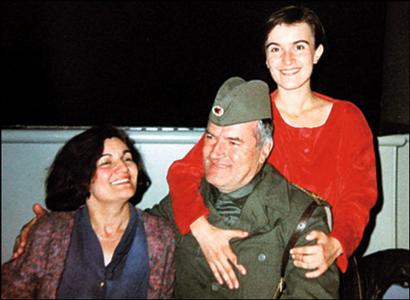28 years ago today I embarked on a journey that changed my life forever. This is the luggage tag that I used on my first visit to Bosnia on 19 December 1992, a few months after the start of the war.
I stumbled across this tag while going through my papers after returning home from prison.
Throughout the next three years of the war I made several more trips to Bosnia. I was there within days of the Srebrenica massacre, in which 8000 innocent Muslim men, women and children were slaughtered in cold blood by Serb forces.
The United Nations described it as “a horror without parallel in the history of Europe since the Second World War.”
The Srebrenica massacre was carried out under the command of Serb General Ratko Mladic. Mladic is currently in prison in The Hague, awaiting trial for war crimes, after being arrested and extradited there in 2011.

“Allah can’t save you, but Mladic can,” said Mladic to Ibrahim Nuhanovic, a Muslim civilian interpreter, in a video-recorded meeting a few hours before the massacre began.
During the meeting, Mladic was calm and soft-spoken. It was clear to all those present that Mladic was not just making empty threats.
A judge at the International Criminal Tribunal for the Former Yugoslavia in The Hague described the massacre in these words:
“After Srebrenica fell to besieging Serbian forces in July, 1995, a truly terrible massacre of the Muslim population appears to have taken place.
The evidence tendered by the Prosecutor describes scenes of unimaginable savagery: thousands of men executed and buried in mass graves, hundreds of men buried alive, men and women mutilated and slaughtered, children killed before their mothers’ eyes, a grandfather forced to eat the liver of his own grandson.
These are truly scenes from hell, written on the darkest pages of human history.” [emphasis added]
Unsurprisingly, after meeting survivors from the Srebrenica massacre over 20 years ago, I am not shocked by what is happening in the warzones of the world today.
I already know the depths of depravity that human beings are capable of descending to.
The people of Srebrenica were helpless. They were abandoned by the world and betrayed by the United Nations “peacekeepers” standing by, who were supposed to save them.
There were no smartphones in those days. The people of Srebrenica were unable to upload short videos of final messages and last words to loved ones, to friends, to the world, before they were slaughtered.
Words cannot articulate the feelings of innocent people besieged in a city which is about to be overrun by a powerful army.
They die deaths that are twice as painful than other deaths. That is because along with the pain of death, they die in the pain of being abandoned by the world.
But there is still something to comfort those suffering in darkness and despair, as the following true story shows.
Imam Al-Shafi once said,
“There is a verse in the Quran that every oppressor should be terrified of.”
He was asked which verse that was, to which he replied,
“But your Lord never forgets.” [Quran 19:64]
On the face of it, Allah forgot about the massacre of Srebrenica. The survivors and relatives feel the daily pain and absence of their loved ones, while those who did the massacres carry on living their normal lives.
Or do they?
General Ratko Mladic, the man who ordered the massacre at Srebrenica, had two children, a son and a daughter.
His daughter Ana was more beloved to him than any thing or person on the planet. It is said that Mladic loved Ana more than any man can love another human being.

On 24 March 1994, almost two years into the war in Bosnia, Ana, a beautiful 23-year old medical student at the time, went into the bedroom of her father and took out a box.
Inside the box was a silver revolver that Mladic had been awarded for exemplary merit when he graduated from Military School. It was Mladic’s favourite gun.
Mladic had vowed to use this gun to celebrate the birth of the grandson he had hoped that Ana would give him.
Ana picked up her father’s gun, put it to her skull and pulled the trigger. Her body was found lying on the floor of the blood-spattered bedroom.
It is said that she took her life because she knew what her father had done.
So the same Mladic who boasted that he, not “Allah”, could save his victims, was unable to save even his own daughter.
A former colleague of Mladic later said in an interview: “Mladić’s life had two phases – before and after the death of Ana. He never recovered. He was a broken man.”
In May 2011, some 16 years after the massacre at Srebrenica, Mladic was captured while hiding in a village in northern Serbia. Before he was extradited to The Hague, Mladic had one last request for his captors.
He wanted to make one last visit to the grave of his daughter.
His request was granted. And, on the way to the airbase, the top-security convoy stopped at the Topcider cemetry in northern Serbia.
The confident, macho general who was known for his swagger, got out of the SUV. He knelt down at the grave of his daughter and sobbed. A broken man.
It was as if he sobbed the tears of all the mothers who lost sons at Srebrenica.
A few minutes later he was ushered away and extradited to The Hague. He is expected to die in prison. And after he dies, he will face his victims.
So humans might forget, humans will forget…
But your Lord never forgets. Indeed.
Read my story where I describe my visits to Bosnia here.
Enter your email address in the mailing list below to receive my blog posts by email.



This is really comforting to understand that Allah never forgets.
LikeLiked by 2 people
No He doesn’t. It’s comforting for some and terrifying for others.
LikeLiked by 1 person
Assalamualaikum Br Barbor
This is Umm Ismail from Greece.
Pleas keep writing – insha Allah you will inspire me to do the same ?
LikeLiked by 2 people
Wa alaikum salam Siyana, I hope you and Abdul Jalil and your family are well. I wrote a post about you recently, stay blessed and carry on the work you are doing… https://babarahmad.com/2016/11/16/an-inspiring-hero-from-my-community-in-south-london/
LikeLiked by 1 person
As the saying goes; ‘What goes around comes around.’
LikeLiked by 2 people
A brilliant piece this time brother.
Thank you.
Bought me comfort and also the that much needed reminder that we are all just at his mercy.
Allah swt doesn’t need an army.
“It was as if he sobbed the tears of all the mothers who lost sons at Srebrenica.”
LikeLiked by 2 people
Every day of his in that lonely prison cell will be torture for him, trust me.
LikeLiked by 1 person
Great post
LikeLiked by 2 people
Brother there is an inconsistency in our report. Please clarify. The genocide at Srebrenica occurred in July 2005 according to Wikipedia. You state that Ana took her life in March 1994 apparently because of Mladic’s role in the massacre. Please correct / clarify this.
LikeLiked by 1 person
Maybe you looked at the wrong Wikipedia page? I was there soon after Srebrenica happened and it was definitely in 1995 (in 2005 I was in prison).
LikeLike
Jazakallahu Khairan for the correction. I typed the wrong date because I meant 1995. Srebrenica occurred after Ana took her life. So her suicide predates the massacre.
LikeLike
But by the time she committed suicide her father had already been responsible for the killings of ten times as many Bosnian Muslims who were killed at Srebrenica. Srebrenica was just the biggest of his atrocities, there were many smaller Srebrenicas at the start of the war in 1992. She knew that, that’s why she took her own life.
LikeLike
Jazakallahu Khairan, I appreciate the clarification. I really appreciate your efforts and your blog. Keep it up and May Allah (swt) reward you abundantly.
LikeLiked by 1 person
Allah save us all from oppression and more importantly, save us from committing oppression. Ameen.
LikeLike